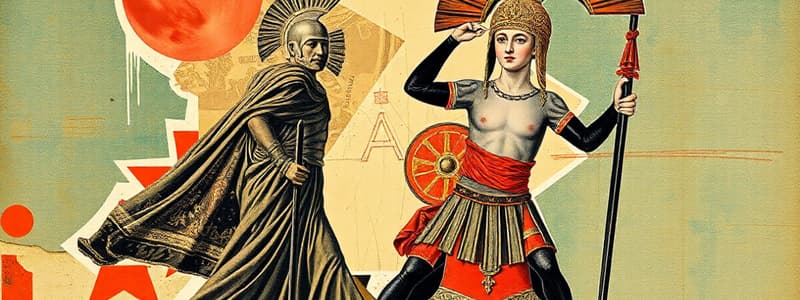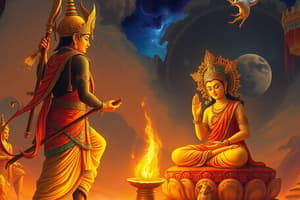Podcast
Questions and Answers
What was the name of the evil spirit in Zoroastrianism?
What was the name of the evil spirit in Zoroastrianism?
- Ahura Mazda
- Zarathustra
- Ahriman (correct)
- Mithras
What was a significant characteristic of life in Sparta?
What was a significant characteristic of life in Sparta?
- Life resembled that of a military camp. (correct)
- There was a focus on artistic development.
- Women enjoyed more freedoms than in Athens.
- Helots were treated exceptionally well.
Who was the Athenian statesman known for weakening the aristocracy?
Who was the Athenian statesman known for weakening the aristocracy?
- Socrates
- Pericles
- Solon
- Cleisthenes (correct)
What was the outcome of the Peloponnesian War?
What was the outcome of the Peloponnesian War?
What was Socrates condemned for?
What was Socrates condemned for?
Which cultural center was known for having the largest library in ancient times?
Which cultural center was known for having the largest library in ancient times?
What contributed to the advancement of medicine in the Hellenistic era?
What contributed to the advancement of medicine in the Hellenistic era?
Who were the perioikoi in relation to Sparta?
Who were the perioikoi in relation to Sparta?
What was a key aspect of Zoroastrianism regarding human morality?
What was a key aspect of Zoroastrianism regarding human morality?
Which statement accurately reflects the status of the helots in Sparta?
Which statement accurately reflects the status of the helots in Sparta?
What was the primary consequence of the Peloponnesian War?
What was the primary consequence of the Peloponnesian War?
For what reason did Alexander the Great's troops rebel during his campaign?
For what reason did Alexander the Great's troops rebel during his campaign?
Which philosophical movement was characterized by questioning traditional societal values?
Which philosophical movement was characterized by questioning traditional societal values?
What role did the mystery cults play in the Hellenistic world?
What role did the mystery cults play in the Hellenistic world?
What was the geographical significance of Rome in its historical context?
What was the geographical significance of Rome in its historical context?
Who was responsible for establishing ten tribes in Athens and decreasing the power of the aristocracy?
Who was responsible for establishing ten tribes in Athens and decreasing the power of the aristocracy?
What was the role of the paterfamilias in Roman society?
What was the role of the paterfamilias in Roman society?
Which statement accurately describes the relationship of the perioikoi to Sparta?
Which statement accurately describes the relationship of the perioikoi to Sparta?
Flashcards
Zoroastrianism's concept of free will
Zoroastrianism's concept of free will
Zoroastrianism taught that humans have the power to choose between good and evil.
Ahriman in Zoroastrianism
Ahriman in Zoroastrianism
The evil spirit in Zoroastrianism.
Spartan life
Spartan life
Spartan society strongly resembled a military camp, emphasizing discipline and war.
Perioikoi
Perioikoi
Signup and view all the flashcards
Cleisthenes
Cleisthenes
Signup and view all the flashcards
Battle of Marathon
Battle of Marathon
Signup and view all the flashcards
Paterfamilias
Paterfamilias
Signup and view all the flashcards
Hellenistic Era cultural center
Hellenistic Era cultural center
Signup and view all the flashcards
Spartan Society's Structure
Spartan Society's Structure
Signup and view all the flashcards
Hellenistic Period
Hellenistic Period
Signup and view all the flashcards
What made Rome a natural crossroads?
What made Rome a natural crossroads?
Signup and view all the flashcards
Why were the Sophists controversial?
Why were the Sophists controversial?
Signup and view all the flashcards
The role of Paterfamilias in Roman society
The role of Paterfamilias in Roman society
Signup and view all the flashcards
The impact of mystery religions in the Hellenistic Era
The impact of mystery religions in the Hellenistic Era
Signup and view all the flashcards
Why did Alexander the Great's troops rebel?
Why did Alexander the Great's troops rebel?
Signup and view all the flashcards
The Egyptian Gold Mines and Slaves
The Egyptian Gold Mines and Slaves
Signup and view all the flashcards
The importance of Alexandria in the Hellenistic Era
The importance of Alexandria in the Hellenistic Era
Signup and view all the flashcards
How did medicine progress during the Hellenistic Era?
How did medicine progress during the Hellenistic Era?
Signup and view all the flashcards
Study Notes
Zoroastrianism
- Zoroastrianism emphasized the free will of humans to choose between good and evil.
- Ahriman was the evil spirit in Zoroastrianism.
- Life in Sparta was similar to a military camp.
- Spartan society had no social classes.
- Slaves (Helots) were treated well and expected long lives.
- Spartan government did not employ democratic procedures.
- Spartan women were more secluded compared to Athenian women.
Sparta's Neighbors
- Perioikoi were free inhabitants of neighboring Sparta.
- They paid taxes and served in the military, but weren't considered citizens.
Athenian Statesmen
- Cleisthenes established ten tribes in Athens.
- He weakened the aristocracy and empowered common citizens.
Military Victories
- Greeks won a decisive victory at the Battle of Marathon.
- Spartans fought bravely at Thermopylae.
Peloponnesian War
- The Peloponnesian War led to Athens' defeat and the collapse of Athenian power.
- The war impacted many societies.
Sophists & Socrates
- Sophists challenged traditional societal values.
- Socrates faced execution for corrupting Athenian youth.
Alexander the Great
- Alexander's troops rebelled when he planned to invade India.
- Many slaves worked in Egyptian gold mines during this era.
Hellenistic Culture
- Alexandria was a significant cultural hub with a world-class library
- Hellenistic medicine advanced through dissection and vivisection.
- Hellenistic religions and mystery cults helped pave the way for Christianity.
- The Hellenistic period saw the spread of the Jewish population throughout the eastern Mediterranean.
Roman Expansion
- Rome was situated strategically at a crossroads in Italy, enabling easy defense and expansion.
- Rome's territory grew, governing provinces using consuls.
- The paterfamilias was the head of the Roman family.
- The Twelve Tables introduced an early Roman code.
- The First Punic War began with Rome sending troops to Sicily.
- The Second Punic War involved Carthage using land forces to cross the Alps into Rome.
- Cato led the movement for Carthage's utter destruction.
- The Third Punic War resulted in the complete destruction and subjugation of Carthage.
Studying That Suits You
Use AI to generate personalized quizzes and flashcards to suit your learning preferences.





